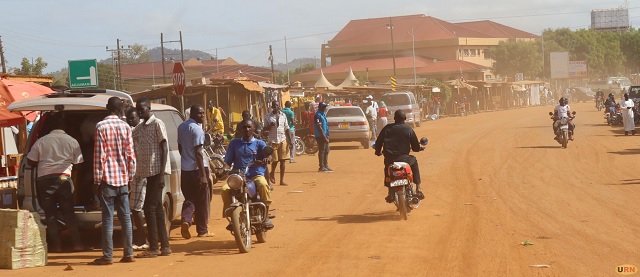Elegu township is struggling with no banking services. URN photo Amuru, Uganda | THE INDEPENDENT | The absence of banking services continues to frustrate the growth of businesses in Elegu township, the main point of entry to South Sudan through Amuru district.
The town council has a population of 17,000 people with more than 500 of them engaged in cross-border trade. They deal in general merchandise, agricultural produce, hardware, restaurants and supermarkets among others.
For nearly two decades, Elegu border post has been the main trading centre for South Sudanese from where 90 per cent of goods imported from Uganda are processed. At least 300 cargo trucks cross to Juba daily.
Margaret Ayoo, the chairperson of Elegu Women Cross Border Traders Association says the traders cannot grow or expand their businesses to match the growing demand and supply because of lack of credit facilities. Ayo told URN that they are forced to use mobile money services to transact businesses, yet this subjects them to exorbitant withdrawal charges.
Ayoo added that recently, the Eastern African Sub-Regional Support Initiative for the Advancement of Women (EASSI) helped the women traders to form and register a cooperative society for fresh food and produce, which still cannot bridge for adequate credit facility.
Sheila Kawamara-Mishambi, the Executive Director of EASSI, engaged the traders and implored the leadership of Amuru to develop investment plans and opportunities that can attract banks in Elegu to spur economic development at the border.
Ivan Kakaire, the Uganda Revenue Authority-URA Regional Manager acknowledged that the lack of banking services possess a great challenge to the border community. Kakaire added that DFCU Bank, which had established a branch in the area about five years ago, was forced to relocate after flash floods devastated their investment.
Amuru Resident District Commissioner Geoffrey Oceng, explained that due to the absence of banking services, several traders have lost money to thieves while others lost their savings to sudden fire outbreaks.
Government through the different agencies earns a daily revenue of between 14 to 15 million Shillings and a monthly collection of between 400-450 million Shillings. However, the border post is characterized by poor infrastructure development.
*****
URN
